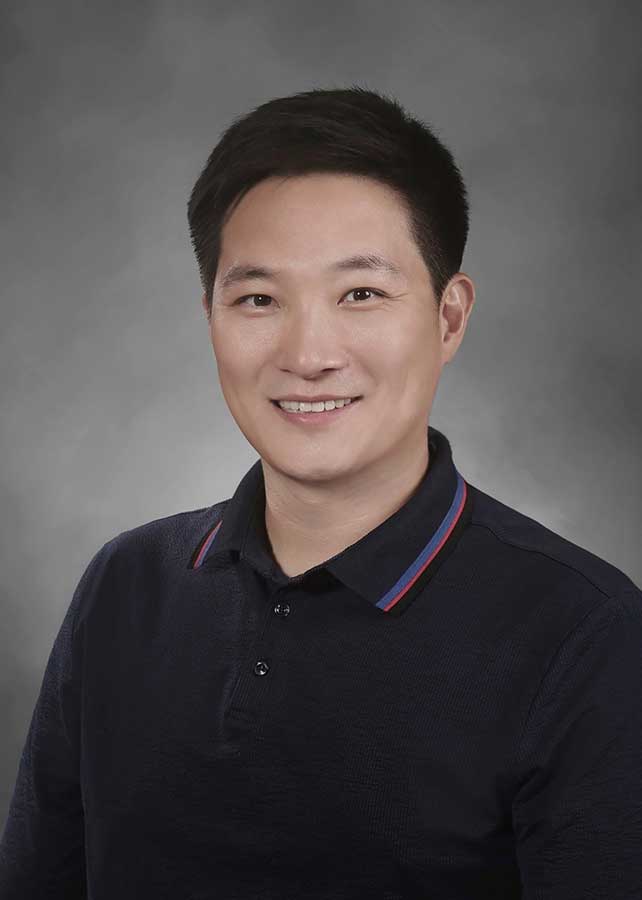Joon Young Kim
Ph.D.Assistant Professor
Joon Young Kim is a patient-oriented researcher with specific focus on childhood obesity, metabolism and type 2 diabetes. His research focuses on understanding of the pathophysiology/pathogenesis of prediabetes, and type 2 diabetes in obese youth.
Education
NIHT32 Postdoctoral Scholar. University of Pittsburgh School of Medicine & Center for Pedaitric Research in Obesity and Metabolism, UPMC Children's Hospital of Pittsburgh
Postdoctoral Associate. Department of Pediatrics & Division of Weight Management and Wellness, UPMC Children's Hospital of Pittsburgh
Ph.D. Arizona State University, Kinesiology/Exercise Physiology
B.S. Yonsei University (South Korea), Physical Education
Specialization
Childhood obesity; metabolism; type 2 diabetes; emerging biomarkers of diabetes risk; metabolic syndrome; polycystic ovary syndrome; exercise physiology; single nucleotide polymorphisms; lifestyle interventions for minorities.
Research Focus
His research has focused on
- Identification of novel phenotypic biomarkers and genetic targets of obesity and type 2 diabetes
- Pathophysiology of prediabetes and type 2 diabetes in obese youth vs. adults
- Genetic contributions (i.e., SNPs) to the emerging biomarkers of type 2 diabetes
- Interaction effects of genetic component and physical activity on cardiometabolic traits
- Effects of lifestyle intervention on emerging biomarkers of type 2 diabetes risk in obese youth
Learn about Dr. Joon Young Kim’s Clinical Research Laboratory
Research Projects
RISE (Restoring Insulin SEcretion)
Dr. Kim is a writing group member of the National Institutes of Health-supported-funded RISE trial which is an ongoing multi-center project testing the efficacy of two treatment strategies on measures of β-cell function in obese youth with prediabetes or recent onset type 2 diabetes (<6 month). His responsibility is to lead two writing sections as a co-chair with Dr. Arslanian (Co-PI of the RISE). The overall purpose of these two sections is to provide head-to-head comparisons of the OGTT-glucose-response-curve between youth and adults with prediabetes or newly-onset type 2 diabetes, and to investigate its prospective utility for diabetes improvement or deterioration.
Childhood Insulin Resistance
Dr. Kim is collaborating with his postdoc mentor, Dr. Silva Arslanain, to utilize in vivo data of type 2 diabetes pathogenetic factors (measured by hyperinsulinemic-euglycemic and hyperglycemic clamps, tracer isotopes and oral glucose tolerance test) in obese youth who are at highest risk for prediabetes and type 2 diabetes. The purposes of this collaboration and secondary analysis is to understand pathophysiology of type 2 diabetes between youth vs. adults, and to identify novel biomarkers of diabetes risk in obese youth.
Statistical Expertise
Dr. Kim has statistical expertise in cross-sectional and longitudinal analyses (Generalized linear models, generalized estimating equations, and ROC analysis) by using SPSS.
Courses
EXE 500 - Pediatric Obesity
Recent Publications
- Kim JY, Tfayli H, Bacha F, Lee S, Michaliszyn SF, Yousuf S, Gebara N, Arslanian S. •-cell Function, Incretin Response, and Insulin Sensitivity of Glucose and Fat Metabolism in Obese Youth: Relationship to OGTT Time to Glucose Peak. Pediatr Diabetes. 2019; Nov. [Epub ahead of print] [PMID: 31677208]
- Kim JY, Bacha F, Tfayli H, Michaliszyn SF, Yousuf S, Arslanian S. Adipose Tissue Insulin Resistance in Youth on the Spectrum From Normal Weight to Obese and From Normal Glucose Tolerance to Impaired Glucose Tolerance to Type 2 Diabetes. Diabetes Care. 2019;42(2):265-272. [PMID: 30455334] [PMC6341282]
- TODAY (Treatment Options for Type 2 Diabetes in Adolescents and Youth) Study Group. Arslanian S, El Ghormli L, Kim JY, Chan C, Bacha F, Ismail H, Tryggestad J, Katz L, Levitsky L, White N. The Shape of the Glucose Response Curve during an Oral Glucose Tolerance Test: Forerunner of Heightened Glycemic Failure Rates and Accelerated Decline in β-cell Function in TODAY. Diabetes Care. 2019;42:164-172. [PMID: 30455329] [PMC6300703]
- Complete List of Published Work

